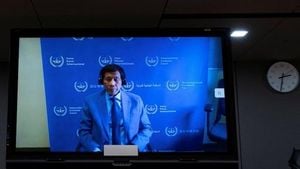The Constitutional Court in South Korea announced on March 20, 2025, that it will decide the fate of Prime Minister Han Duck-soo regarding his impeachment. This highly anticipated ruling comes after Han, who was suspended from his duties by former President Yoon Seok-youl, faced allegations of blindly following orders during his term as acting president.
The decision about Han's impeachment is crucial, as it precedes another significant ruling regarding President Yoon, who is currently also suspended. The court has yet to announce when it will issue its judgment on Yoon's case, making concerns over South Korea's political stability palpable.
Han was suspended from his role on December 27, 2024, following an objection raised by the opposition-led parliament. The parliament was discontented with Han's refusal to appoint three additional judges to the Constitutional Court, a demand that sparked intense political conflicts.
During the period of Han's suspension, the responsibilities of the presidency have been assumed by Choo Kyung-ho, the Minister of Finance, as the Constitutional Court deliberates the cases regarding both Han and Yoon.
With growing instability in the political landscape, many are closely monitoring the ruling on March 24. Observers point out that the implications for both Han and Yoon could be far-reaching, potentially reshaping the public's confidence in the government.
The Constitutional Court's upcoming decision will not only influence Han’s future but is also expected to have significant repercussions on the governance of South Korea. As the court prepares to weigh in on the legal and ethical considerations of Han's tenure, anticipation builds among citizens and political analysts alike.
Experts suggest that Han's close connection to Yoon and the turbulent relationship between the executive and legislative branches of government will be pivotal in shaping the court’s verdict. Analysts denote these legal battles as indicative of systemic issues within South Korea's political framework, reflecting the adversarial dynamic that has characterized the nation’s governance for years.
The tumultuous backdrop against which Han's impeachment unfolds highlights the broader context of South Korean politics, which has seen numerous political upheavals and scandals over the past decades. Given the current climate, this ruling might very well serve as a litmus test for the political landscape moving forward.
As the court prepares to deliver its verdict, many questions loom: Will Han be reinstated, and how will the court’s decision on Yoon's case unfold? The stakes are higher than ever, with public opinion hanging in the balance.
The situation highlights the fragility of political alliances and the potential for considerable reform in governance structures, as citizens push for accountability and transparency within the political system. The Constitutional Court's impending ruling serves as a reminder of the checks and balances that are integral to a functioning democracy.
In the meantime, Choo Kyung-ho continues to manage the functions of the presidency amid this unsteady environment, acting at a time when the need for stable leadership has never been greater. The outcomes of these legal challenges will likely resonate beyond the immediate political sphere, leaving indelible marks on the future of governance in South Korea.
As the nation awaits the pivotal decisions from the Constitutional Court, the political landscape remains charged and unpredictable—a reflection of both the historic struggles and aspirations that define South Korean democracy.




